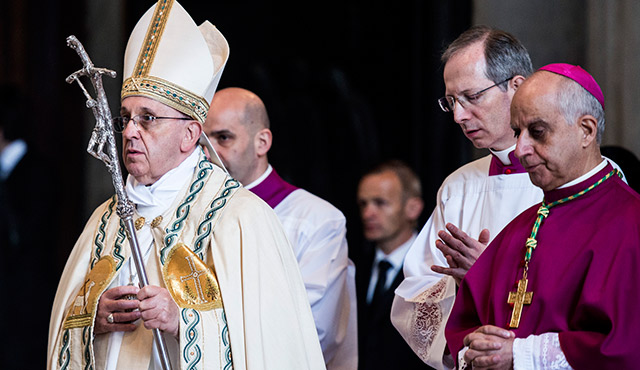As we greet the announcement of the “Year of Mercy” that our Holy Father recently promulgated and that will begin on Dec. 8 of this year, it would be a worthwhile preparation to reflect a bit on the concept of mercy, especially as it has been lived out and prayed for centuries in the life of the Church. Growing up, I remember, for example, the phrase “Jesus, have mercy on me” or “Sacred Heart of Jesus, have mercy on me, a sinner.”
Having just passed the tenth anniversary of the death of the great Saint John Paul II, we remember that he passed away on the vigil of “Divine Mercy” Sunday, which he had inserted into the liturgical calendar. Mercy seems to have been woven through the threads of his writings. I recently found one of his own sentences in the introduction to “Gift and Mystery,” which is a short, easy-to-read handwritten reflection on the story of his own vocation. In the introduction to this book, he says regarding the narration of his life and vocation: “What I relate here, above and beyond the external events, belongs to my deepest being, to my innermost experience. I recall these things above all in order to thank the Lord. ‘Misericordias Domini in aeternam cantabo!’ [This translates as “I will sing forever of the mercies of God.”] I offer this to priests and to the people of God as a testimony of love.”
Pope Saint John Paul II wrote an entire encyclical in 1980 entitled “Dives in Misecordia – Rich in Mercy.” It has recently been retranslated into a more free-flowing version. It is short (only 14 pages) and worth a good read in preparation for the upcoming Year of Mercy. I would refer to several short quotes from this encyclical for our consideration: “The present day mentality, more perhaps than that of people in the past, seems opposed to a God of mercy, and in fact tends to exclude from life and to remove from the human heart the very idea of mercy. The word and concept of ‘mercy’ seem to disturb man who, thanks to the development of science and technology, never before known in history, has become the master of the earth and has subdued it and dominated it. This ‘domination over the earth,’ sometimes understood in a one sided and superficial way, seems to leave no room for mercy.”
The Holy Father closes this section with these words: “Therefore I want these considerations to bring this mystery closer to everyone. At the same time I want them to be a heartfelt appeal of the Church for mercy which humanity and the world need to much. And they need mercy even though they do not realize it.”
Perhaps an even more eloquent reflection on mercy can be found in the homily of then Cardinal Joseph Ratzinger at the funeral of Pope John Paul II, whose tenth anniversary of death we just passed. I remember the homily well, as I was watching the funeral mass. Toward the end of his homily, Cardinal Ratzinger said of the late pope, “He interpreted for us the Paschal Mystery as a mystery of divine mercy. In his last book he wrote: The limit imposed upon evil ‘is ultimately Divine Mercy.’ The Holy Father found the purest reflection of God’s mercy in the Mother of God. He who at an early age had lost his own mother, loved his divine mother all the more.”
In these 50 days of the Easter Season, the Risen Lord accompanies us all as we journey through this life with the message of his new life given to us, and the promise of Divine Mercy. A blessed Easter season to all, and thanks to all for their hours of dedication, work and ministry through Lent, Holy Week, and the Paschal Triduum.
Alleluia! He is risen!

